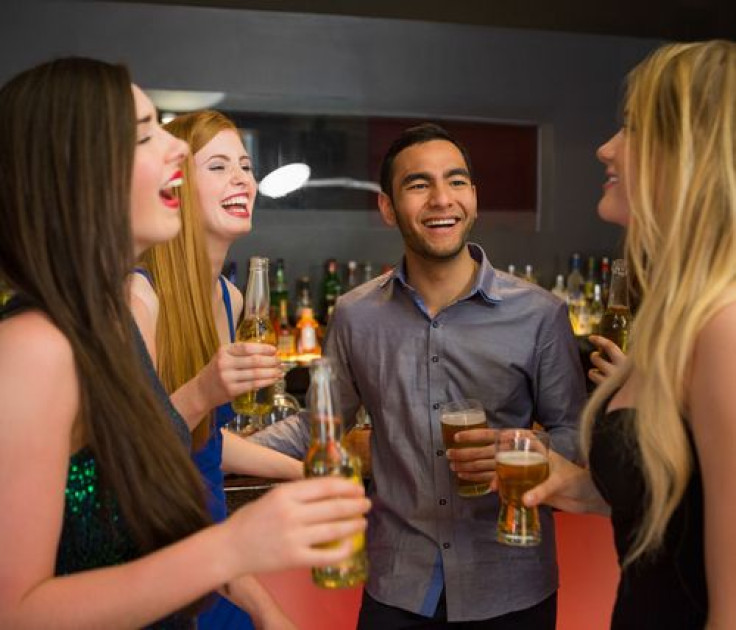Drinking Buddies Deny Influence Over Beverage Choices: Is Behavior Contagious Among Friends?

Many of us have been caught using this popular expression at bars and restaurants: “I’ll have what (s)he's having.” Making a similar choice as your dining or drinking companion maps social behavior by showing how ideas, behavior, and culture can spread through simply copying what others around you do. Despite the powerful influence a friend may have on food and drink choices, people who copy a friend’s drinking behavior will deny that their choice was directly impacted by their drinking buddy, according to a study in Alcoholism: Clinical and Experimental Research.
"Social pressure can have an enormous effect on people's drinking habits,” said Dr. Eric Robinson, leader of the study from the Institute of Psychology, Health and Society, in the news release. Dr. Robinson and Rebecca Dallas, an undergraduate student from the University of Liverpool, believe that by showing alcohol drinking as an acceptable behavior, partners can easily influence their friends’ drinking choice without being aware of it in the study. This pattern highlights how susceptible people are to using the brains of others to “think” for them and as a source about worldly knowledge.
Forty-six pairs of friends were recruited for the study conducted at the university’s bar laboratory, designed to imitate a bar, to observe how strong of an influence these pairs had on one another. Unlike prior studies on this topic, researchers sought to focus on how much people of all ages — who were already friends — would be more likely to copy each other’s drink choices. Once the pairs arrived at the lab, one of the each was informed about the “experimental aims” of the study and how to behave. The other friend was told they were taking part in a study of “social problem solving.”
The uninformed partners in the social problem-solving study were instructed by the researchers to either drink alcoholic drinks, or stick to soft drinks throughout the experiment. The pairs were then asked to sit down and complete a game during which the partner in-the-know was asked to order their drink first. This action would be telling for the researchers whether friends could influence each other’s behavior without realizing it.
The findings revealed social pressure appeared to predict the drink choices of the partner unaware of the fake study. Of the people whose partner choose an alcoholic drink, 80 percent also chose one, compared to 90 percent of partners who chose a soft drink. Interestingly, only 18 percent of the participants admitted that their partner’s choice may have influenced their choice of beverage. "What we didn't find out was whether people genuinely didn't know they were copying their friend, or if they were just embarrassed when we asked them afterwards!" Robinson said.
It seems like Robinson’s query could fall on both sides of the coin. Whether or not the partners were aware of his/her friend’s influence on their choices, peer pressure is a major factor that can impact social behaviors. Peer pressure and perceived social norms in a college environment have been attributed to excessive drinking in college students. The shift of influence from parents to peers during college is significant as students begin to view their peers as important and a source of support. Peers attitudes and behaviors, along with the alcohol-based social opportunities greatly contribute to the drinking culture at college.
A study presented at the Agricultural and Applied Economic Association’s annual meeting in Washington, D.C., found friends can also play a bigger role than calorie labeling when it comes to food choices. The reasoning behind this finding could be because "We want to fit in with the people we're dining with," said Dr. Brenna Ellison, author of the study and food economist. The dining peer pressure could be a good thing if people are taught to lean toward eating with healthier friends, rather than just simply being told to eat healthier foods.
Although the researchers of the new study do not know whether the partners knowingly copied their friends’ drinking choices of either alcohol or soft drinks, it shows there may be an upside to peer pressure after all.
Sources:
Dallas R, Robinson E. Drinking buddies deny copying alcoholic drink orders. Alcoholism: Clinical and Experimental Research. 2014.
Ellison B, Lusk J. “I’ll Have What He’s Having”: Group Ordering Behavior in Food Choice Decisions. Agricultural and Applied Economic Association’s 2013 AAEA and CAES Joint Annual Meeting, Washington, D.C., Aug. 4-6, 2013.



























